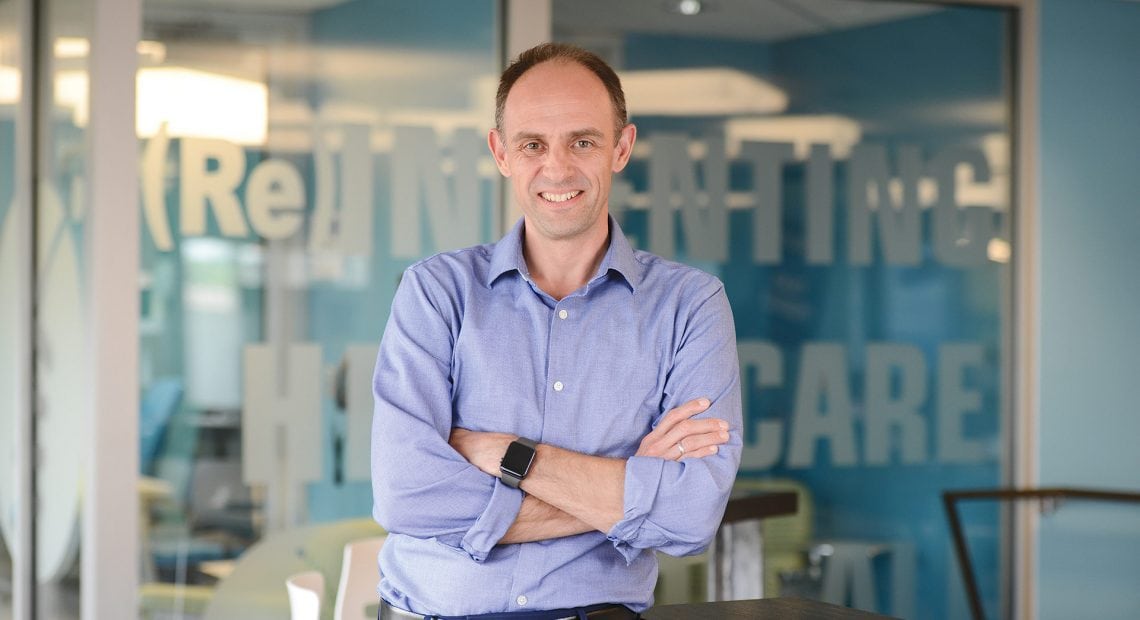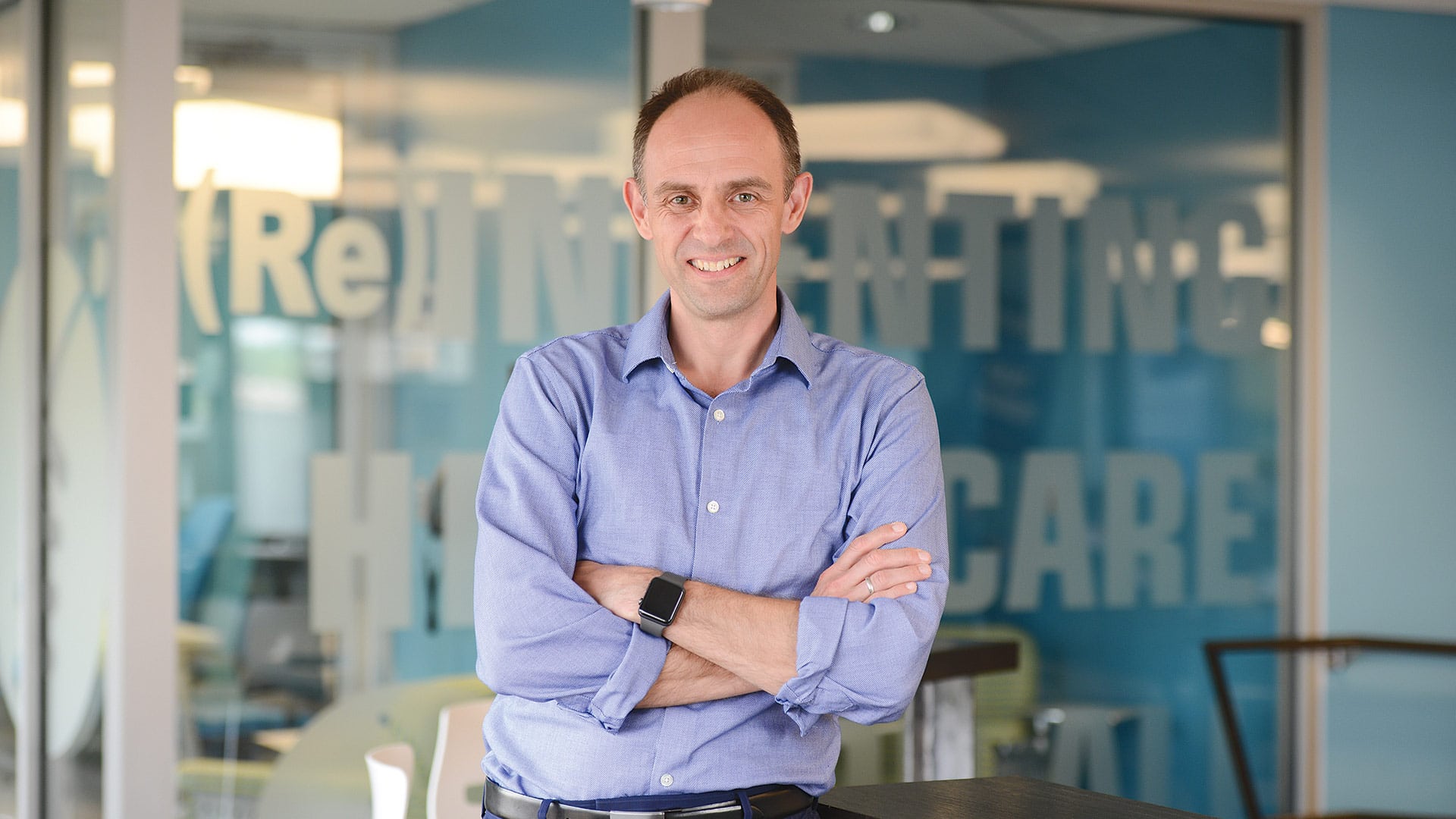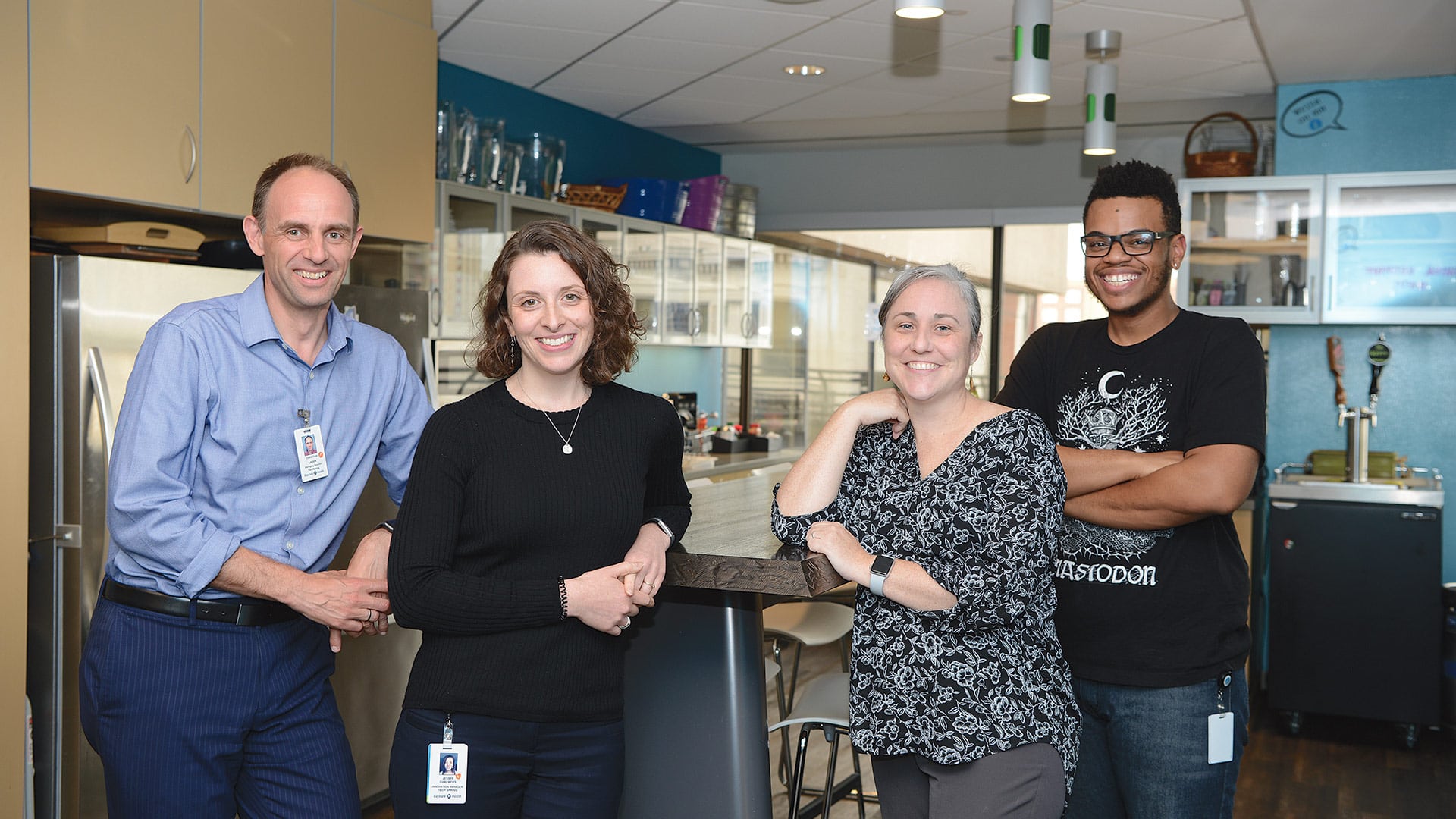
Innovation in Health/Wellness: TechSpring
This Unique Venture Exists at the Intersection of Innovation and Technology

Christian Lagier, managing director and co-founder of TechSpring.
Christian Lagier has a deep background in entrepreneurship, business operations, and strategic business development.
He’s been involved with startups and high-growth companies in Paris and Copenhagen, and he spent 10 formative years in Silicon Valley’s high-octane startup environment at arguably its zenith (the ’90s).
Thus, he’s an expert in … collisions.
That’s a word you hear quite often within the realms of innovation and entrepreneurship. Generally, it refers to the art and science (because it’s both) of bringing people together and making things — meaning products, services, and the companies to provide them — happen.
Soon after leaving the San Francisco area behind to come to Western Mass., Lagier became a key driver in an effort to bring collisions to a different, higher level, and to a sector where you don’t hear that word as much as you do in others — healthcare.
The result was TechSpring, a unique venture that is based in Springfeld. But its exact location, as Lagier likes to say, is at “the intersection of healthcare and technology.”
“We’re trying to bring these sides together in a place where we can democratize technology development, or bring people into the process.”
That phrase speaks volumes about not only what TechSpring is, but why, more than three years after it was launched, it has met or exceeded both expectations and goals. And why a panel of judges determined that it (meaning the sum of all its parts and the all the people behind it) is the Healthcare Hero in the highly competitive category called simply ‘Innovation in Health/Wellness.’
Summing it all up, Lagier, the venture’s managing director and co-founder, said TechSpring has realized a vision established four years ago to take external innovators into a partnership of sorts with Baystate Health, its 1 million patients, and thousands of providers to accelerate innovation in healthcare technology.
“We’re trying to bring these sides together in a place where we can democratize technology development, or bring people into the process,” he explained, “and do it in a way that’s aligned with the goals of an organization that is working hard to deliver high-quality, high-value care every day.”
In the process of democratizing the innovation process, TechSpring has become a real force within the region’s economy and, especially, its innovation sector. It serves as an innovation hub in every sense of that word, said Lagier, noting that brings people together in all sorts of ways.

Christian Lagier, seen here with team members at TechSpring, says the facility, and especially its kitchen, were designed to promote collisions.
First, as co-working space — there are about 80 people working there now — but also as a conference center and site for programs such as its monthly innovation open house, known as Tap into TechSpring.
“It was important to us as we were doing this project to have healthcare come out of the ivory tower, if you will,” Lagier explained. “We wanted to open the doors and create a public forum, a physical hub for all the people in Western Mass. and beyond who are working at that intersection of healthcare and technology.”
There is mounting evidence that this model works and should be emulated. For example:
• It has grown from one employee to eight;
• There have been more than 30 completed innovation projects, all with learning or operational outcomes;
• Tap into TechSpring, has attracted more than 4,000 participants since it was initiatied more than three years ago;
• The venture has received trade delegations and leadership visits from Israel, Denmark, Ireland, Singapore, Australia, and other countries;
• At any given time, there are between five and 10 projects in development or active execution; and, perhaps most importantly,
• TechSpring has generated more than $7 million in revenue or savings for Baystate Health.
Which means that the sizable investment made by the system in TechSpring has more than paid for itself.
Maybe the best example of how TechSpring works, and why it was named the hero in the Innovation category, is Praxify, an intuitive, easy-to-use mobile application designed to enhance the provider experience by bringing patient information directly into the palm of one’s hand.
“We heard clearly from our organization, and specifically from our physicians working at Baystate, that the electronic medical record system had grown unwieldy and that it was consuming too much time to get information in and out,” Lagier explained, adding that NTT, one of TechSpring’s innovative partners, introduced people there to a startup in India that had developed a mobile app that was user-friendly and fast to use.
When representatives of that company came to Springfield with their demos, they were introduced to roughly 30 Baystate doctors who, long story short, helped them refine the concept into something that works.
Thus, Praxify is an example of just how well the original vision for TechSpring has, in fact, become reality.
“When we started this project, it was big ideas and PowerPoint slides,” he told BusinessWest. “And you have this vision. Looking back on it four or five years later, after making many of these come to life and become real … that’s a great point of pride.”
Food for Thought
As he talked about collisions and the ongoing work to bring them about, Lagier said everything about TechSpring’s facility on the fifth floor at 1350 Main St. was designed with that goal in mind.
Even the kitchen. Or especially the kitchen, as the case may be.
With the old-fashioned water cooler pretty much a thing of the past, the kitchen is the place where people gather now, he told BusinessWest, adding that, in addition to politics, sports, and what TV shows they’re binging, people at TechSpring also talk about what they’re doing.
And they listen to other people talk about what they’re doing, and when there’s two or three or four people having such conversations, this is how collisions take place. So the kitchen was designed to promote this kind of activity.
“It’s large, open, and has seating,” Lagier explained. “This is the place where people connect informally and begin chatting, and where a wonderful thing happens every day at TechSpring — someone finds an opportunity to help someone else, and that’s what we need to accelerate change in healthcare.”
Kitchen design is one of the few things not on Lagier’s résumé. As for what is, well, it’s an interesting mix.
Out of high school, he actually worked as a foreign-language tour guide in bustling Copenhagen (he’s fluent in six languages, including Danish, French, and English). He also worked as a deck hand on an offshore oil rig in the North Sea and hitchhiked his way around the world for a year.
He eventually settled down and earned master’s degrees in economics and business administration from Copenhagen Business School and Université Catholique de Louvain in Brussels and then went to where the action was.
“I moved to Silicon Valley to seek adventure and the application of technology to real-world problems,” he said, hitting upon what could be considered a theme to his career. “I was there in ’95, which was an exciting tine to be in Silicon Valley.”
After starting out in management consulting, Lagier held management positions in companies such as Memolane, Vivino, and Proxicom. He spent a decade in Silicon Valley, but decided, in collaboration with his wife Allison, who had ties to this region, that Western Mass. (Williamsburg in Hampshire County, to be exact) was the place to raise a family.
“It was a lifestyle choice for us,” he said, adding that, while he’s lived in some fast-lane places — Paris, Copenhagen, and San Francisco are all on that list — this is home, and the mailing address he’s most fond of.
Fast-forwarding a little, Lagier worked in administration at Smith College for a few years. Just over five years ago, had lunch at Max’s Tavern with Joel Vengco, chief information officer for Baystate Health. It was a lunch that would eventually pave the way for TechSpring and begin to change both the innovation and healthcare landscapes in this region.
“Joel, like me, has broad experience from different geographies and parts of life, and when he came here, he had a vision for an opportunity that presented itself to a region like this one and an organization like Baystate to be a better participant in the transformation of healthcare that we all know is necessary,” he explained. “He presented this vision to me of creating a small and nimble organization that could facilitate the collaboration between external technology innovators and a full-size, real-life health system.”
That vision represented something very different from anything that existed at that time, he went on, adding that there was no real model for TechSpring and that those who launched it created a new model. But it was also something very necessary given the way technology was advancing and healthcare was evolving.
“We all know that healthcare needs to change,” he explained. “We know that part of the solution is process and people, and we know that technology needs to support these changes that are necessary. TechSpring is an effort to help those two sides — the people and the technology — come closer together in solving these problems.”
While doing that, there are broader goals as well, he said, adding that, from the beginning, those involved with TechSpring clearly understood that innovation had to “pay off,” as he put it, meaning there had to be a direct line of sight to the value that comes from innovation.
“We talked a lot about how this can’t be science experiments, and it can’t be long-term R&D — there have to be some concrete outcomes from this, and also financially,” he explained. “We had also set the goal of TechSpring being self-funded, and we’ve achieved that goal.”
Getting the Idea
At the core of this unique model, made possible by a $5.5 million grant from the Massachusetts Life Sciences Center, TechSpring becomes a consulting company of sorts, said Lagier, one that supports external technology innovators that have ideas for effective solutions in healthcare and helps them collaborate more closely with healthcare professionals and even patients, and then brings all these parties together in the technology-development process.
Over the years, the list of innovative partners has grown and now includes such companies as:
• Cerner, the leading provider of electronic-medical-record (EMR) and population-health systems worldwide;
• Imprivata, a Boston-based company focusing on solutions that make access to IT systems easier for employees and patients;
• NTT Data, a worldwide leader in systems integration and delivery of technical solutions;
• Kordova, a Boston- and Springfield -based startup focused on creating cost visibility in surgery supplies;
• athenahealth; a Boston-based provider of EMR systems; and
• Firefly Labs, a local startup originated at Baystate Health that has created a solution that makes case reporting and the accreditation process easier for surgery residents.
Connecting such innovators with a large health system like Baystate sounds simple and rather obvious, but such collaboration between these two worlds has mostly been missing, and is still missing in many markets.
“There’s been too much technology that has been developed and sort of pushed into healthcare,” he went on. “It’s our ambition to turn this around and have it be more of a pull from users, the healthcare professionals and patients, who say, ‘these are the solutions that we need,’ and then enabling the technology innovators to solve for that.”
“He presented this vision to me of creating a small and nimble organization that could facilitate the collaboration between external technology innovators and a full-size, real-life health system.”
While doing that, the broad goal is to create those aforementioned collisions.
“They’re a key piece of innovation theory,” Lagier explained. “Innovation is not linear — it’s not something you can plan out or mastermind. Innovation depends on a lot of coincidence, but, as Pasteur said, ‘chance favors the prepared mind.’ At TechSpring, we’ve created an environment that is conducive for coincidences to happen.”
And there were a number of coincidences and collisions behind Praxify, which was born, as most innovative concepts are, out of a need to solve an identified problem.
“To this day, this industry has a challenge — that doctors are spending too much time at the computer, and that takes away time that they can spend with a patient,” said Lagier. “There are many facets to that challenge, and we put that challenge out into the world, saying, in essence, ‘what solutions are out there that we can bring to our physicians that might improve this problem?’”
As noted earlier, a startup in India had a solution — or the makings of a solution. And to refine its concept, the company worked in tandem with doctors at Baystate.
“Rather than sitting in a conference room or drawing something up on whiteboards, we said, ‘first, you have to experience real healthcare,’” Lagier noted. “And they got to just follow a physician and watch over his or her shoulder and get direct feedback — ‘this works for me,’ or ‘this doesn’t work for me.’”
With that feedback, rapid prototyping ensued, he went on, adding that the innovators went back and said, in essence, ‘is this what you’re looking for?’ Some said yes, some no, and more collaboration followed.
A prototype was developed, validated at Baystate, and put into production for a pilot user group comprised of 80 physicians. The development was so successful and promising that the startup was acquired by athenahealth, another of TechSpring’s innovation partners, for $63 million.
For Lagier, the key takeaway from the example of Praxify is how the collaborative model — bringing innovators together with healthcare providers to accelerate new-product development — works not just in theory, but in reality.
“I had dozens of physicians who were energized by the process — just having a voice, just having an opportunity to be part of the technology-development process,” he told BusinessWest. “That they got an app out of it that they could use and that made their life better was a bonus.”
Healthy Collaboration
As Lagier noted, there have been a number of delegations from different states and different countries that have come to the TechSpring suite to see how the unique concept works — and how it might work for them.
The kitchen is usually part of the tour because that’s where a good number of collisions happen — collisions that can lead to practical solutions to the issues and problems facing those providing healthcare in today’s challenging and always-changing environment.
Those tours — a world apart from those Lagier led before busloads of tourists in Copenhagen — represent one of the best indicators of the success of the TechSpring model and its ability to bring innovators and healthcare providers and patients together in collaboration — something that’s needed to solve these complex problems.
As much as anything else, they show why all those at TechSpring are Healthcare Heroes.
George O’Brien can be reached at [email protected]




